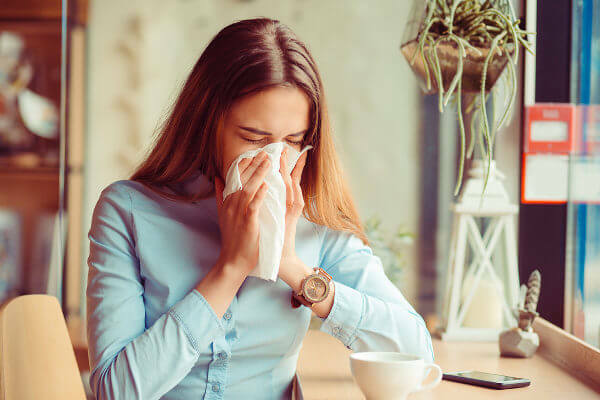Every year we come across the traditional campaign of vaccination against the flu. But if we were already vaccinated in the previous year, is it necessary to vaccinate in the current campaign? Next, we'll answer these and other important questions about flu and flu vaccinations.
→ What is the flu?
The flu is a diseaserespiratory caused by the influenza virus, with three types of this virus being identified in Brazil: THE, B and C, with types A and B being responsible for seasonal epidemics. The flu is a disease that is often confused with the cold, however, the latter is caused by other viruses (mainly rhinoviruses).
The transmission of flu happens mainly through the contact with particles eliminated by sick people or by contact with the hand or objects contaminated by secretions of these sick people.
Influenza is an airway infection that is characterized by causing fever, dry cough, malaise, body pain, headache and sore throat. Fever is, without a doubt, the most important symptom of this disease and lasts, on average, three days. The fever, in these cases, is usually above 38ºC.
Although many people think that the flu is a simple illness, it is the cause of death for many people every year, mainly in individuals who have conditions that favor the complications of the disease.
Among the groups that deserve attention are the elderly, people with chronic diseases, children under 5 years of age and pregnant women. It is noteworthy that the main complication of the flu is the pneumonia which can be triggered by bacteria or the virus itself.
Read too:Difference between flu and cold
→ Why should we vaccinate against the flu every year?

The flu vaccine changes annually to suit the viruses that are circulating that year.
Despite what many people think, every year we must vaccinate against the flu. This is mainly due to two main facts:
Influenza viruses undergo many mutations, which alter their structure and consequently generate a series of subtypes.
Every year, the World Health Organization analyzes the main types of flu viruses that are in circulation to create a more effective vaccine.
We can therefore conclude that annual vaccination is important, as viruschange and the viruses that circulate in the population in one year will not necessarily be the same as in the following year. It is noteworthy that the flu vaccine is important and helps to reduce complications.
Read too: Influenza A (H3N2)
→ Why does vaccination usually start before winter?
We know that in winter the transmission of respiratory diseases intensifies, this is related, among other factors, to our stay indoors and to dry air, which contributes to airway irritation.
As a result of these factors, vaccination usually starts before winter, so that when this season begins, the population is already protected. According to the Ministry of Health, the period of greatest flu circulation is between the end of May and August.
→ After vaccination, how long does it take for immunization to take place?
According to the Ministry of Health, in healthy people, protection occurs about 2 to 3 weeks after vaccination. After this period the person is protected for approximately one year.
Read too: Tips to prevent H1N1 flu (Influenza A)
→ Can everyone get the flu vaccine?
The flu vaccine is a very safe vaccine, however, this does not mean that vaccination can be carried out indiscriminately. They are contraindicated to be vaccinated against influenza as children under six months and people with a history of anaphylaxis at previous doses.
According to the Technical Report of the National Influenza Vaccination Campaign of the Ministry of Health in 2019, some studies have shown a good tolerance to influenza vaccination in egg allergic, therefore, this public can receive the vaccine. In the case of people with severe allergies, the vaccine will be administered in suitable environments. It is noteworthy that the vaccine should not be administered to people with fever. To receive the vaccine, the febrile condition must have ceased.
→ Who can vaccinate for free?

In the elderly, flu can be quite dangerous, so this group is among those prioritized for vaccination.
The National Influenza Vaccination Campaign guarantees free vaccination of the following groups below:
Children from six months to under six years old (5 years, 11 months and 29 days)
health workers
pregnant women
postpartum women
Indian people
Elderly people (individuals aged 60 years and over)
Public and private teachers
population deprived of liberty
Adolescents and young people from 12 to 21 years of age under socio-educational measures
Prison System Officials
safety and rescue force
People with non-communicable chronic diseases and other special medical conditions
Read too: How to prevent the flu in the school environment
→ What manifestations can I have after the vaccine?
After vaccination, some manifestations can be observed, such as pain at the site, redness on the skin and induration. These local demonstrations usually disappear after two days. Also, some people may submit fever, achemuscular and malaise, demonstrations that last from one to two days. These last manifestations are observed in less than 10% of vaccinated people. Other adverse events after vaccination are very rare.
→ In addition to the vaccine, what other measures can help prevent the flu?

Flu can trigger complications, so prevention is essential.
The flu is a disease transmitted through droplets, containing the virus, eliminated by people who are sick by sneezing, coughing or even talking. In addition, they can also be transmitted through contact with hands and objects contaminated by secretions from patients. Some simple measures can help prevent us of this disease, in addition to vaccination, such as:
Avoid direct contact with people who have the flu;
Do not share personal items such as bottles, glasses and cutlery;
Avoid touching the muscles of the nose, mouth and eyes after contact with surfaces;
Keep environments well ventilated;
Avoid agglomerations and closed environments;
Always wash your hands with soap and water;
Keep a balanced diet;
Perform physical activities;
Drink lots of fluids.
By Ma. Vanessa Sardinha dos Santos
Source: Brazil School - https://brasilescola.uol.com.br/saude-na-escola/por-que-devemos-vacinar-todos-os-anos-contra-gripe.htm

